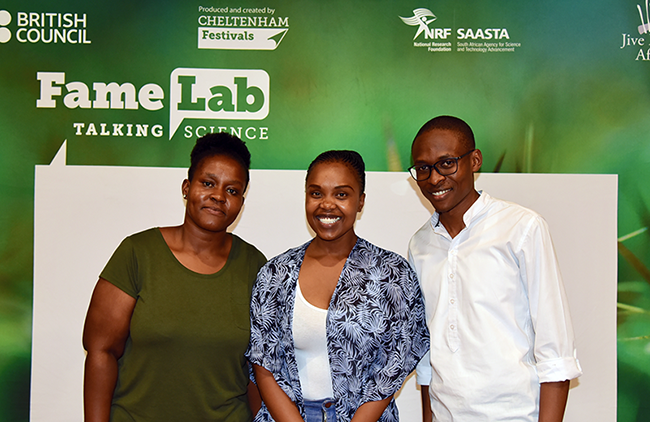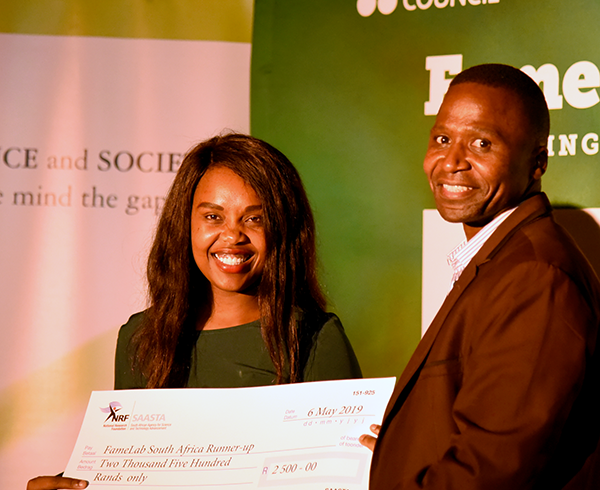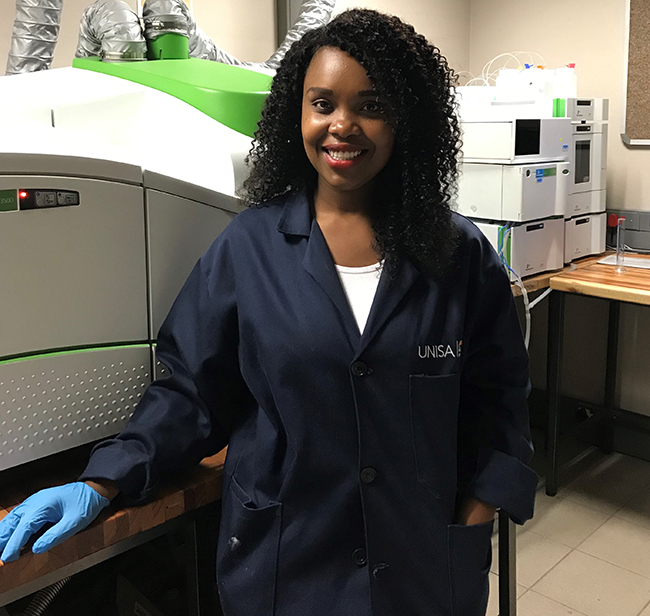News & Events
Research must 'speak to the people,' says Unisa PhD student
Many scientists are doing brilliant work, but if nobody else knows about it or understands it, much of its impact is lost. This is why the art of communication, including public speaking, is so important for up-and-coming young researchers.
“The key is to be able to communicate your science work to the general public so that it’s interesting, without watering it down,” says Charmaine Tshangana, PhD student at Unisa's Nanotechnology and Water Sustainability (NanoWS) research unit. “A lot of people don’t understand what we are doing and how it affects their lives – because it does.”

The three Unisa FameLab finalists: Precious Sithole, Charmaine Tshangana, and Rapelang Patala
Intent on improving her ability to communicate about her water-purification research, Tshangana entered FameLab 2019, an international science communication competition where each contestant has just three minutes to present their science work or research to the judges.
Having won the Unisa heat of the 2019 FameLab competition in March this year, she participated in the national FameLab finals in Durban and was runner-up. Although she did not win, she relished the opportunity to compete against the FameLab winners from 13 other higher education and science institutions around the country.
Tshangana, who has "no fear at all" of public speaking, says she feels strongly about finding solutions to problems for Africa’s people. “A lot of innovations come from Asia and Europe. I am truly passionate about Africa being at the forefront of technological innovations.”
Wanting to make a difference sooner rather than later, she moved away from the research she pursued for her chemistry honours and master’s at Rhodes University towards her current PhD focus: solar-driven water purification using nano membranes.

Charmaine Tshangana, a PhD student at the NanoWS research unit, was the runner-up at the national finals
"For my masters in medicinal nanochemistry, I was trying to find an alternative to chemotherapy for cancer patients, but that kind of research is extremely lengthy; it could take up to 20 years to bear fruit,” she says. “In my current work, I have more control over where this research can go and could start running my own business as an entrepreneur in the relatively near future.”
Most importantly, her work would be helping to make a difference to one of Africa’s most difficult challenges. "We have a water crisis. My granny lives in Mpumalanga and when I went to visit, the water that came out of the tap was a funny colour and smells. When I saw that, I asked myself how I could help. I did a lot of reading and found this group, NanoWS at Unisa."
In a nutshell – an important criterion in FameLab – her PhD work at the research unit is as follows: "We are working with a solar-driven water purification system. We harvest energy from the sun and it goes through a pressure system. Then filtration takes place, using nano membranes that I design, and from there, the water is safe to drink."

Charmaine in her natural environment
Tshangana learnt a lot about communicating science during her FameLab journey. "The challenge is to grab the attention of your audience and articulate the work while keeping to your science – all in three minutes."
Her supervisor, Prof. Edward Nxumalo, says he is proud of her participating in the national finals. "Charmaine is an extremely gifted individual who has set up herself for success; I don’t doubt that she is going places,” he says, adding that the annual FameLab competition is helping to hone Unisa’s young research talent.
“FameLab has become such an important vehicle for our postgraduate students to communicate and demonstrate their innovative technologies to the world.”
Publish date: 2019-05-20 00:00:00.0

